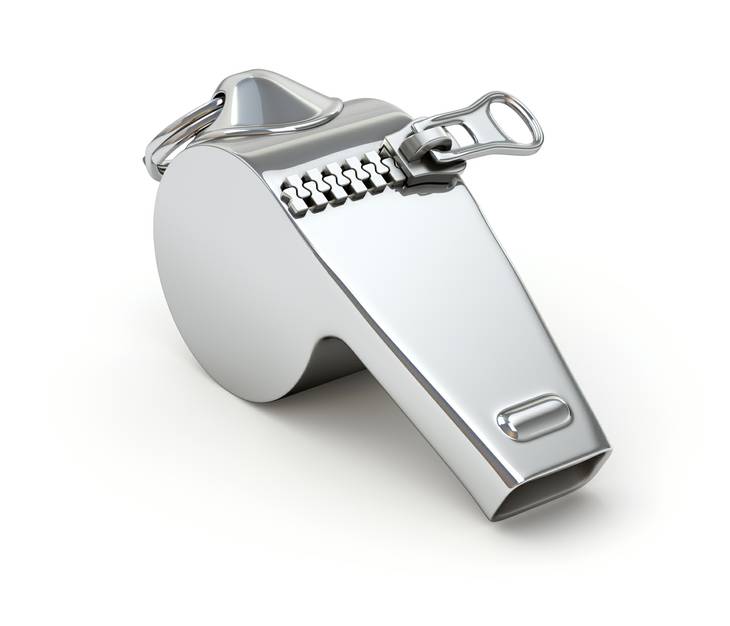Here’s a workplace scruples question: You discover your supervisor adding payroll hours to benefit a colleague. Or your company knowingly dumps chemical waste that could contaminate groundwater. Or the boss fudged paperwork to win a government contract.
How would you respond? You can ignore it, of course. Or you could let someone know.
If it’s the latter, the situation could get dicey as you make the leap from employee to whistleblower. Soon, you could have a target on your back.
The National Conference of State Legislatures defines whistleblowers as people — usually employees or former employees — who report fraudulent or illegal activity by their employer, the government or an organization.
If a whistleblower reports a violation of federal law, there are provisions to protect them from retaliation. The Department of Labor lists the regulations on its website — dol.gov/compliance/laws/comp-whistleblower.htm.
But Nevada is one of 15 states without a state statute guaranteeing protection for whistleblowers. That means there’s risk to public- and private-sector employees who could face retaliation, including being fired, for calling attention to illegal or corrupt workplace conduct.
If the employee believes an action against him is in retribution for speaking up, he’d have to prove wrongful termination in court.
There are rules to be followed. Lawsuits in whistleblower wrongful-termination cases have been thrown out of court because employees failed to first report the information to an outside government authority, before reporting it to a workplace superior. For instance, if a casino employee witnesses a co-worker or boss doing something illegal, he is supposed to report it first to the Nevada Gaming Control Board, not his employer, to buttress his claim of wrongful termination if he is dismissed.
So what should you do if you want to blow the whistle on a workplace problem you think is illegal in Nevada?
Attorneys Nick Crosby of MAC Law, Mary Kinas of Kinas Law Office, Richard Segerblom of the Law Office of Richard Segerblom and Andrew Rempfer of Cogburn Law Offices offer these suggestions:
• Talk to a governing agency. Report your concerns, in writing, to a governing agency that oversees your line of work. That identifies your motive as for the public good.
A case in point: Wiltsie vs. Maxim
The need for whistleblowers to go to legal authorities before taking complaints to employers became especially clear in the 1989 case involving Jerry Wiltsie, a Las Vegas poker room manager at the Maxim.
He told higher-ups in the company that his supervisor was participating in illegal activities. Wiltsie was fired, which he claimed was retaliation for calling out his boss. He sued the hotel’s owner, Baby Grand Corp., for wrongful termination.
But because Wiltsie did not report his suspicions to an outside regulatory authority — in this case, the Nevada Gaming Control Board — the Nevada Supreme Court ruled that even though he may have been fired for whistleblowing, he wasn’t entitled to protection.
“Because appellant (Wiltsie) chose to report the activity to his supervisor rather than the appropriate authorities, he was merely acting in a private or proprietary manner,” the court ruled.
Had Wiltsie reported to the gaming board, he would have been seen as acting on the behalf of public good, and the outcome of the case may have been different.
• Identify yourself. When you report to the governing agency, provide your name. You will not have a case if you make the complaint anonymously.
• Tell your boss. Make your boss aware you have contacted a governing agency.
• Talk to a lawyer. Seek consultation from an attorney who practices in the specified field.
• Keep evidence. Save emails, texts and any other evidence you have that points toward the problem and/or action sought against you.
• Document. Document everything in writing.
Document comments your employer makes that show he is disgruntled about your whistleblowing. (Under Nevada law, you are allowed to record in-person conversations with your boss without his or her knowledge.)
Document if you suddenly are criticized for actions you have been doing for years that weren’t a problem before you blew the whistle.
Document if you are demoted, have your pay cut or are switched to a less favorable shift.
Do not print or scan company emails because you could be accused of stealing company property. Instead, write down the dates and email addresses in the emails so your lawyer can retrieve the evidence legally.
• Have witnesses. Keep track of people who could help prove your case. For example, if comments about your whistleblowing are made in a colleague’s presence, that could work to your benefit.
• Be prepared. Whistleblowers could spend months in a courtroom and feel alienated from colleagues. Before reporting a workplace issue, ask yourself if you are ready for what may lie ahead.
Despite the potential challenges, if you win a case for wrongful termination, you likely would receive a financial award. If you were fired, you would be compensated for lost wages and could receive compensation for emotional distress. Your employer also might have to pay punitive damages.
More importantly, you can sleep well at night knowing you did the right thing.
